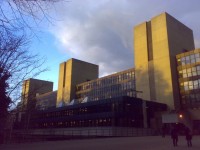
It’s some time now since I finished Wolfram Fleischhauer’s latest novel, Der gestohlene Abend, which I enjoyed so much I wanted to blog about it even before I’d got past page two. But the trouble with his novels are that it’s difficult to describe why you like them so much without giving away one of the greatest causes of the enjoyment, which are his plots.
Then on Wednesday, on my way to Roehampton University to get hold of some articles that were unavailable elsewhere, I realised what it was that I had enjoyed so much about this latest novel, and indeed all his novels.
As I was climbing the interminable West Hill on my bike, freezing my face off and trying to avoid ice patches, then emerging in the quasi countryside of the bit beyond Tibbet’s corner (and nearly coming off my bike in some frozen mud in the underpass), I began to feel a sense of exhilaration and excitement at the thought of finally being able to read these two articles (a very critical review and an author’s response to it) that were so hard to get hold of.
It was partly the physical challenge of getting at the stuff that made reading it so much more exciting. It’s an odd way to get your kicks, I thought. And then I realised that I’ve always been a bit like this about books and information – the more obscure and difficult to get at it is, the more fascination it holds (see here, for example). It’s a similar concept to Walter Benjamin’s ‘aura’ – by the time I got to the journals section of the library, and finally found the item I had seen referred to so often, but never seen in the flesh, the journal seemed to vibrate and radiate aura on its shelf.
And then I remembered that this is often what happens in Fleischhauer’s novels. There’s a search for some truth that is not necessarily even hidden, it’s just that no-one except one of his protagonists can be bothered to look for it, because the journey is hard. It usually involves a real, physical journey, and physical encounters with obstacles to information like difficult librarians, illness, early closing, being attacked, or hindrances like misinformation, concealment, or simply mistakes. It might involve detours and time-consuming blind-alleys, or having to gain new skills and knowledge in an unfamiliar field.
The search for truth, which often hangs on some minuscule detail, involves his heroes and their circle in adventures which are every bit as exciting as the truth that is about to revealed, and the reverse is true too: Fleischhauer’s searches for truth are like cognitive car chases. His novels are, even if this is not their main aim, tales of the thrill of investigation and curiosity. You rejoice that your hero refuses to let things pass until he or she has solved the mystery, crime, conundrum that everyone else is happy to leave alone. And sometimes, things you’ve been looking at all the while (like the title of the book) are found to reveal unexpected secrets and meanings.
Funnily enough, I wouldn’t have been able to describe my excitement in Walter Benjamin terms had I not been reminded of the book in Der gestohlene Abend. I must – finally – read that book, I thought, and so I did. Benjamin’s book is about art works in an age of mechanical reproduction, but every time I visit a library, I get an excitement about being in the presence of information, and the possibility of finding things in some quiet corner that no-one looks at, that is unrivalled by anything you can do or find on the web.

